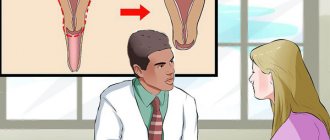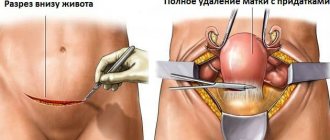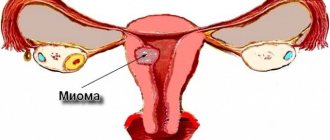Is intimate life acceptable after surgery?
The answer to this question is ambiguous. The resumption of sexual life depends on the characteristics of the operation, individual reactions to it, the woman’s psychological state and physical well-being.
If there are no precautions after surgery, the woman feels well, the damaged tissues have been restored, and sexual life after removal of the uterus is possible after some time.
https://youtu.be/GriA2JZKqKU
How to decide to have a hysterectomy?
Most often, hysterectomy is recommended for women between 35 and 50 years of age. It is easier to get ready for surgery if it is planned. It is much more difficult for those who have their uterus removed urgently. This is especially painful for those who have not yet given birth or were planning to give birth to another baby.
Women share that for some time they “feel an inner emptiness,” “they can’t look at pregnant women, come to terms with the fact that they won’t be able to give birth,” “they don’t know how to tell their husbands about this.”
As the reviews of those who have gone through this say, it takes time to come to terms with it.
- I try not to think about the fact that I am not like other women. But this is now, a year later, and at first I was only thinking about this... Leila.
- For everyone around me, I had a female operation. I didn’t tell anyone except my husband that my uterus was removed. The doctor reassured me that the uterus is just a sac that helps carry the baby. I have two children, I didn’t plan any more. My uterus has done its job. Thanks to her for this. Now I live without a uterus. I feel almost no changes. My husband supports me. Everyone, as they say, has their own sorrows. Thank you for living and walking. Irina.
Statistics show that in some countries, women after 50 specifically have their uterus removed. So, they say, the risk of developing cancer is reduced.
But there are other statistics. Among the most common consequences of hysterectomy are the following:
- The functioning of the vegetative-vascular system is disrupted;
- The functioning of the bladder and intestines changes (the most common mistakes made by doctors during surgery);
- There is a restructuring of the functioning of the bladder, which is unusual for the first time to work without the support of the uterus;
- The work of the sweat glands increases;
- Blood sugar levels increase;
- There is a depressed depressive state;
- Internal hematomas are formed at the sites of cutting off the uterus and appendages, which bleed;
- The walls of the vagina, which were previously supported by the uterus, fall out.
In medical practice, abdominal and endoscopic removal of the uterus is performed.
- Abdominal surgery (laparotomy) is performed through an incision on the anterior abdominal wall. The method is considered traumatic, but it provides great access and in some cases there is simply no alternative. For example, if the uterus has reached a large size due to fibroids.
- The second method is endoscopic surgery (laparoscopy). In this case, the surgeon removes the uterus through punctures in the anterior abdominal wall. Laparoscopic hysterectomy is much less traumatic and allows for faster recovery after surgery.
- Vaginal hysterectomy is the removal of the uterus through the vagina.
Abdominal surgery to remove the uterus through a large incision is one of the most traumatic procedures. In addition to the complications caused directly by the removal of the uterus, such an operation has other negative consequences.
1. After the operation, a noticeable scar remains.
2. High probability of hernia formation in the scar area.
3. Open surgery usually leads to the development of extensive adhesions in the pelvic area.
4. Rehabilitation and restoration (including performance) requires a lot of time, in some cases up to 45 days.
Uterine cancer is adenocarcinoma and carcinoma is a malignant process. The choice of treatment method and extent of intervention depends on the stage of the disease.
Previously, the initial stages of cancer (in situ cancer, microinvasive cancer) and precancerous diseases (grade 3 cervical dysplasia, atypical hyperplasia) were indications for hysterectomy. Unfortunately, oncological surgery does not eliminate the cause of the disease - the human papillomavirus - and therefore has a high rate of relapses.
With the advent of photodynamic therapy for these diagnoses, it became possible to preserve the organ and eliminate the very cause of the disease.
What is the essence of the technique? The patient is injected with a drug that increases the photosensitivity of tissues - a photosensitizer. Over time, this drug is removed from healthy cells and remains in atypical cells, including those that contain the human papilloma virus - the cause of cancer and precancerous conditions.
2-3 hours after administration of the drug, the doctor irradiates with laser light to activate the photosensitizer. The photochemical reaction that occurs in response to the interaction of light with a photosensitizer causes the formation of toxic substances harmful to them in pathological cells. Cells die and recovery occurs.
Photodynamic therapy is effective not only before removal of the uterus for dysplasia, in situ cancer, 1A cancer, endometrial hyperplasia, but also after surgery. The procedure allows you to exclude the development of relapse and at the same time preserve the organ.
How long after can I resume sex?
There are standard recommendations from doctors, averaged over time for all women regarding the initiation of intimate relationships. When can you have sex after surgery?
It is recommended to resume sexual activity 2 months after surgery. This is the time for the healing of damaged tissues in the body, wounds. During this period, all functions in the female body are restored. For full physical intimacy, a balanced hormonal background is very important. A woman's attraction to a man depends on hormones. With the help of certain medications, hormonal levels are restored in at least 2 months.
The indicated period is the minimum time for a woman’s recovery. Doctors often give more time for this. Especially when any complications appear in the postoperative period. The textbook version of sexual abstinence is 3 months.
Some patients had no desire to start sexual relations for 6-12 months. Therefore, there is no need to force things. The psychological factor is very important in this matter. If you insist on sex, a significant decrease in libido and complications are possible.
Intimacy
After removal of the uterus, women are sexually active in the same way as healthy women. The main thing is to properly set yourself up psychologically. Some patients are deeply depressed after undergoing hysterectomy. They feel like they are inferior.
Sexual life after removal of the uterus and ovaries exists. The woman continues to be her. In this case, comprehensive support from family and friends is important. The main thing is to show the woman that they need her.
Sexual life after hysterectomy is especially worrying for young women who were planning to have a child. However, after the operation they lost this opportunity forever.
Features of having sex
There are cases when sex life changes after surgery. The reason for this is the woman’s psychological or physiological unpreparedness for intimacy.
The emergence of psychological problems
Women tend to slightly aggravate their condition with a negative attitude towards hysterectomy. This is the main reproductive organ, so some people feel inferior when it is removed. The operation is especially acute if the patient does not have children or would like to become pregnant again.
The mood for the operation, the woman’s attitude towards her condition after it, determines the quality of her sexual life. If the patient feels inferior and does not realize her femininity and attractiveness, sex after hysterectomy will not please either her or her partner. Sexual problems also arise.
Solving the problem is possible even in a short time. If a woman cannot independently adjust herself to a positive attitude, it is better to consult a specialist psychologist. But a loving partner can also raise the patient’s self-esteem with constant encouragement and compliments.
A woman with psychological problems regarding surgery needs to be surrounded with attention and support. It is important for her to realize that she is still as loved and attractive as before. The key point is the constant support of the partner in accepting the new self.
Physiological difficulties
If everything is fine with the patient’s psychological state, the woman experiences a fear of sex due to physiological phenomena:
- Dryness in the vagina. Often, intimate life after removal of the uterus and ovaries is complicated by vaginal dryness. The condition of the mucous membrane is affected by hormonal levels, which are disrupted due to the absence of ovaries (they produce female hormones). The solution to this problem is vaginal lubricants and creams. They can be purchased at a pharmacy or specialty store. Time will pass, fears and concerns will go away, and the excretory function of the mucous membrane will be restored.
- Shortening of the vagina. A woman may feel pain during sexual intercourse, since the man’s genital organ reaches the sutures when the vagina is shortened. But with the right pose, this problem can be solved. Also, fear is not confirmed if the stitches after removal of the uterus are significantly higher than the limit of the penis.
- Prolonged “warming up” of a woman. Patients note that after the operation there is no pleasure from intimacy for a very long time. This phenomenon is caused by tissue trauma and psychological factors. The process of changing a woman’s behavior returns to normal after a certain time.
Limitations in poses
There are no restrictions on positions, but there are certain recommendations on how to begin sexual life after surgery.
- If the patient is afraid of pain, it is recommended that she independently choose sex positions.
- It is convenient to control the process of intimacy in the “cowgirl” position.
- Then you can regulate the frequency of movements.
- The couple should choose other positions for intimacy with mutual consent.
Does a woman have an orgasm after a hysterectomy?
The lack of orgasm is more likely not a physiological, but a psychological problem. The lack of peak pleasure is also associated with a woman’s fear of pain. Also, patients can configure themselves to believe that pleasure is complete only if all organs of the reproductive system are present. But the operation does not affect the labia, clitoris, and G-spot, which, when stimulated, lead to orgasm. Therefore, there should be no physiological problems.
The fear of pain can be prevented by gradually starting penetration of the male genital organ. When a woman feels pain, sexual intercourse can be suspended and then the penis can not be fully inserted. Orgasm after removal of the main reproductive organ may be even better and last longer than before the operation. But a woman’s body must be prepared for this phenomenon.
If a woman no longer feels an orgasm, this indicates that she received pleasure from stimulation of the cervix, which no longer exists.
Orgasm after hysterectomy
It has been proven that many women after a hysterectomy begin to enjoy sexual intercourse even more than before it. Most often this happens in cases where, in the period before surgery, sexual relations were associated with discomfort and pain. The vast majority of patients do not find significant changes in their experiences of sexual pleasure, continuing to experience orgasm, both clitoral and vaginal.
Until now, doctors cannot understand the reasons for this phenomenon. After all, most often a woman experiences an orgasm precisely when the clitoris and a small area inside the vagina (G-spot) are stimulated, which are in no way damaged during the operation.
It is possible that the appearance of such a postoperative problem is associated with the peculiarities of achieving orgasm in some women who need significant penetration of the penis and active stimulation of the cervix. These are those rather rare cases when the nature of a female orgasm is directly related to the uterus and cervix; pleasant sensations come from these organs.
This group of women, after removal of the cervix, will have to rethink their sexual relationships and learn to achieve orgasm through clitoral stimulation. It is hard to believe that this could become some kind of serious test for them, much less the cause of depressive conditions. Rather, it will be a new experience, a “creative search”, an opportunity to get to know your body better and get qualitatively new sensations. As in any type of human activity, in sex, too, sometimes you have to get rid of stereotypes.
Question: Will the inability to not have sex for a long time after a woman’s surgery affect a man’s health?
Answer: during prolonged abstinence, the so-called. sublimation effect. The male body has protective forces that activate and regulate its reactions. One of them is night ejaculation. A healthy man should not experience congestion.
Question: does menopause really occur after a hysterectomy?
Answer: if during the operation only the uterus was removed, and its appendages - tubes and ovaries - were preserved, then the onset of menopause will occur during the period for which the given female body is programmed. There are experts who are of the opinion that the symptoms of menopause in this case appear 2-3 years ahead of schedule, although medical science has not yet found an explanation for this. Removal of the ovaries, indeed, entails the onset of menopause.
Question: should I be afraid of such phenomena after surgery as excessive hair growth on the body and face, weight gain, deepening of the voice?
Answer: no, after removal of the uterus, such phenomena do not occur. When removing the ovaries to normalize hormonal levels, doctors usually prescribe estrogen replacement therapy.
In one of the European countries they decided to study in more detail the issues related to changes in female libido after hysterectomy, observing more than 1000 patients and interviewing them before and after surgery. The results were unexpected:
- Patients aged 35 to 50 years old showed that after the operation the number of them actively having sex increased by 10%;
- Before the operation, 63% of patients experienced orgasm, and after removal of the uterus their number increased to 72%;
- The number of women who said they experienced intense orgasms or multiple orgasms increased from 45% to 56%;
- Before the operation, 40% of women complained of pain during sex, after the operation - only 15%.
In recent years, a campaign has been launched in world medicine calling for patients to preserve female organs to the last and resort to hysterectomy only in the most extreme cases. But US gynecologists strongly disagree with this. Moreover, more than 50% of them consider it necessary to prescribe hysterectomy for their completely healthy wives who have reached the age of 50.
One can only wish that after the trials she has endured, every woman would have a loving and beloved person waiting for her at home, who could understand, support, show care, and, if necessary, regret. And then there will be no problems in your sex life. Sigmund Freud said that sex is not the touching of genitals, but the touching of souls. And one cannot but agree with this.
Consequences of early onset of sexual activity
If a woman violates the timing of sexual intercourse, serious complications are possible:
- Bleeding is a serious risk of blood loss and occurs when sutures come apart. The problem can only be corrected surgically.
- Inflammatory processes - they can be localized in one area, or can cover all involved organs of the reproductive and other systems.
- Diseases of the genitourinary system – most often cystitis. They occur if they occurred before the operation, as well as after it.
When a woman has had her uterus and ovaries removed, you should not forget about barrier methods of contraception, even though there is no longer a risk of unwanted pregnancy. At the same time, the risk of contracting sexually transmitted diseases remains.
Feature of the operation
A hysterectomy is the surgical removal of the uterus. This is an extreme measure that has to be taken in order to save the patient from the development of dangerous pathologies that threaten her life.
Doctors resort to this procedure only if other therapeutic methods have proven ineffective. Sexual life after removal of the uterus and ovaries depends on the type of operation and indications.
Modern surgeons perform uterine amputation in two ways:
- through the vagina;
- through the abdominal cavity, having previously made an abdominal incision.
The vaginal method of performing the operation is the simplest and safest. However, it has a number of contraindications. In some cases, it is possible to do without a complex operation through the abdominal cavity.
Indications for hysterectomy:
- benign or malignant tumor;
- myoma;
- uterine prolapse;
- severe uterine bleeding.
Recovery after surgery depends on the individual characteristics of the woman’s body. Rehabilitation averages one and a half to two months.









